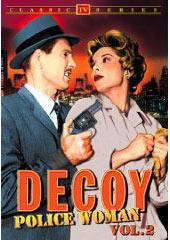
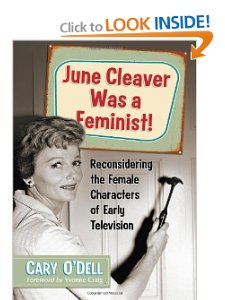



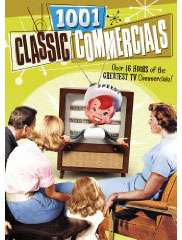

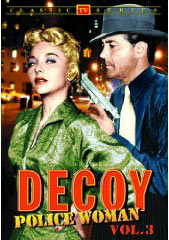
 |
 |
 |
 |
 |
 |
 |
 |
| |
|||||||
|
“KOO KOO!”: Remembering “The Betty Hutton Show” In the firmament of show biz history there is a particular subset of performers. To call them “high energy,” does not begin to cover it. They are almost manic in the no-holds-barred zeal to entertain. Is it a decidedly all-woman group (though a though a young Jerry Lewis might be able to make his case) that includes the likes of Gale Storm, Debbie Reynolds, Martha Raye, and Joan Davis. But of the above sorority, if they had one bona fide leader, it was Betty Hutton. Born Elizabeth June Thornburg in Michigan in 1921, by the time she was three, Betty (with her sister) was already singing in a speakeasy operated by her mother. It was a hard scrapple childhood for Hutton. Her father had walked out of the family and her mother had to turn to illegal taverns to keep a roof over her childrens’s heads. With her mom’s unlawful businesses often the target of local police, the Huttons were often on the move. But daughter Betty’s big voice was soon helping out. By the time Betty was 13, she was a regular performer—often aggressively pushed by her mother. By the time Betty was 16, she was fronting some local bands and appearing on radio. By 1940, she was on Broadway and she made her feature film debut in 1942 in the film “The Fleet’s In.” She achieved true star status two years later when she appeared in the madcap classic “The Miracle of Morgan Creek.” From the get-go of her big screen career, Hutton was known for her full-throttle performance style. Bob Hope once described her as “a vitamin pill on legs” and that late other dynamo, Debbie Reynolds, always named Hutton as her biggest career influence. Hutton, in musicals and comedy, had several big movie successes but achieved true movie immortality when she took on the leading role in the film adaptation of the Broadway smash “Annie Get Your Gun.” The film was released in 1950. Unfortunately, that was sort of Hutton’s last hurrah on the big screen. Though she would go on to appear in 1952’s star-studded “Greatest Show on Earth,” Hutton’s attempts to further her then husband’s career as a director ultimately undermined her own career. (This was husband number three out of four; all of her marriages ended in divorce.) Hence, not long after “Annie,” Hutton was no longer a box office name. So, like many film actresses before her, Hutton, instead, moved to TV to star in her own sitcom. Unfortunately, for every big screen actress who found a second life via TV (like Loretta Young and Jane Wyman), many others fell by the wayside. These included Jean Arthur and Celeste Holm. (Lest anyone think that it was only female movie stars who failed on TV, over the years such beloved male marquee names as Jimmy Stewart, Henry Fonda and Mickey Rooney all tried and misfired in their attempts to land a small screen success.) In her candid 2002 memoir, “Backstage You Can Have,” Hutton is forthright about her move to the small screen. She says, “I had lost the mass popularity and exposure that movies had provided me with. This show was my last-ditch effort to recapture some of the faded glory of my film career….” For her show, Hutton put up most of the early production money herself and, in effort to control the show herself, involved herself in every aspect of it creation--a move she later regretted. She wrote in her memoir, “I paid people who possessed the knowledge and experience to make correct choices for me and the show. However, since it was my show, I was never fully able to trust them. I fought so hard to make it a hit; I believe I got in the way of my own success.”
Debuting in 1959, Hutton starred in the appropriately titled “The Betty Hutton Show,” a 30-minute sitcom which aired over CBS on Thursday nights. The program, a Desilu Production, was sponsored by Post Cereals and Hutton and her cast mates often appeared in breakfast-centric ads during the show—“Post Cereals: Just a little bit better!” In the show, Hutton starred as Goldie Appleby. In the program’s first episode, we meet Goldie. She’s a resident of Greenwich Village and a onetime student of jujitsu. She’s also a former showgirl who is now supporting herself by working as a manicurist. One of her regular clients is wealthy Mr. Strickland who, in the pilot, is played by David White, later of course to be Mr. Tate, Darren’s boss, on “Bewitched.” In the first episode, Goldie is chatting with Mr. Strickland who, despite his wealth is not very happy and very worried about his three mother-less children. He so admires Goldie’s clear-eyed view of the world and her solid values… In fact, he admires it so much he decides to changes his will to make Goldie the sole beneficiary of his will AND the guardian of his three children in case something happens to him! And, then, wouldn’t you know it…. It was very good timing for Mr. Strickland to alter his will because, later that same day, Mr. Strickland passes away and suddenly former showgirl Goldie has inherited $60 million dollars! Oh, and she’s inherited the responsibility of raising his three children--two boys and a girl; the oldest is the girl, Pat; followed by teen boy Nicky and pre-teen Roy. She also acquired his plush New York home and its live-in cook and butler. What Goldie retained was some of her brass and her favorite exclamation: “Koo-koo,” which the producers of the show no doubt hoped would become a national catchphrase. (It didn’t.) “The Betty Hutton Show” seems to be an amalgamation of about a half dozen other sitcoms. For example, “The Beverly Hillbillies” in that the poor have been turned rich overnight. “Family Affair” and “Bachelor Father,” too, as well as any of those other “suddenly a parent” shows. Meanwhile, the similarities between “Betty Hutton” and Fran Drescher’s “Nanny” are striking and probably unintentional: the working-class interloper invading the world of New York old money, three kids, and a butler already underfoot. The foyer of the Strickland’s home even has a sweeping, circular staircase like the one on “Nanny.” (But, then again, most wealthy people on TV do). The comic crux of the series was Goldie trying to get used to her new lifestyle and the kids trying to get used to Goldie. This being a sitcom, the grief the children might have felt about their father’s passing didn’t last long and none of them seemed to resent Goldie, this virtual stranger, suddenly being their “mom.” A comic foil for Goldie was achieved via the character of Mr. Seaton (played by Tom Conway), the stuffy businessman who oversees her finances on behalf of the company; he is the “Mr. Mooney” to Goldie’s “Lucy.” And via the family’s very snooty Aunt Louise, played by Norma Varden (who else?), who was always very concerned about the family’s social standing. As she was on the big screen, often Hutton’s playing is about as subtle as a sledgehammer, though, to be fair, she’s not quite as broad as she tended to be in some of her feature films. She is also allowed to be very glamourous. Though Goldie doesn’t always cotton to many of high society’s rules (in the debut episode, she drinks out of the finger bowl!), she has no problem adopting the great wardrobe of a true lady of the manor. This being (still, barely) the 1950s, the plots of various episodes of “The Betty Hutton Show” weren’t too deep either….though they were not without interest. In one episode, Goldie is concerned that the kids haven gotten spoiled by their servant-aided existence. So, she engineers a plan to make the kids think they’ve gone broke! Though not happy about it at first, soon all three kids are holding down jobs…and learning the value of a good day’s work. In another episode, Goldie says it’s time for Patricia to do something with her life rather than just go shopping and go to nightclubs. So, Patricia decides to become a painter and she moves out and takes up with a bunch of (gads!) beatniks! This is NOT what Goldie had in mind. So, Hutton puts on a black wig with the bangs and adopts a lot of “daddy-o” lingo to go find Patricia and bring her back home. But…after she finds Pat at the “cool pad,” she finds that Pat isn’t doing anything bad or wrong. Yes, the younger generation can be trusted! In the episode, “Roy Runs Away,” youngest boy Roy gets into a fight at school (from a mean bully played by Don Grady!). Goldie is outraged at the fighting but later learns that the fight was because someone insulted Goldie to Roy’s face.
Finally, an episode has Goldie protesting that little Roy shouldn’t miss out on a special father-son event just because his father isn’t living anymore. Goldie takes down the patriarchy! Noteworthy in all this is the fact that, though she had no biological ties to the Strickland children, Goldie was, seemingly, their sole and legal guardian making her (like TV’s earlier “Annie Oakley,” who had custody of her younger brother, Tag) one of TV’s very first—if de facto—single moms. Also of interest is the group of three child/teen actors who supported Hutton on her show. They were played by Gigi Perreau, Peter Miles and Dennis Joel. Gigi (produced with hard “G”’s) Perreau was 18 years-old and played oldest child Patricia. She had been acting since a very young age. Previously, she had roles in the films “Mr. Skeffington” and “To Each His Own.” Perreau largely retired from acting around 1967. Patricia’s brother was Nicky Strickland. He was played by Perreau’s REAL-LIFE brother Peter Miles, 21 at the time, but since he was billed under a different name, few viewers probably knew that the two were related. Miles had been acting since 1944, getting his first on-screen credit in 1947. Though he would continue acting until 1960, he later turned to writing, authoring the novel “That Cold Day in the Park.” He died in 2002. Finally, 12 year-old Dennis Joel played the youngest Strickland, Roy. Joel’s real last name was Olivieri. Under the latter name, he would continue acting and had leading roles in such latter-day series as “The New People” and he appeared in the film “Phantom of Paradise.” In 1968, he released an album titled “Come to the Party.” He passed away in 2006. Though “The Betty Hutton Show” was on for a full season and aired 30 episodes, it was not a hit. Tough competition on the other two networks did it in. Afterwards, for Hutton, there wasn’t much—a few guest starring roles on TV shows including an episode of “Baretta” in 1977. Later, Hutton would struggle for a time, with finances and addiction, but eventually she turned to religion and spent her final years, it’s been reported, happily. She passed away in 2007. Her one-season show has since seen some of its episodes released on DVD and many can now be found on Youtube. |
|
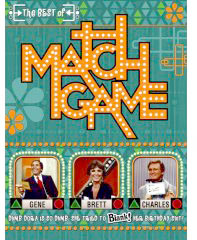 |
 |
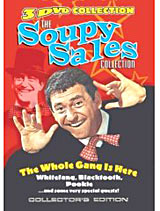 |
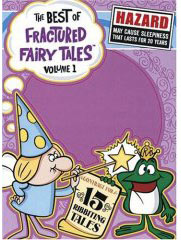 |
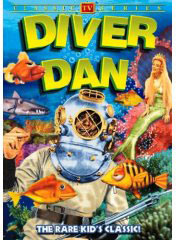 |
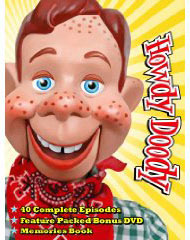 |
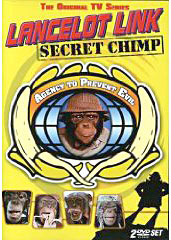 |
|
|
||||||||||
 |